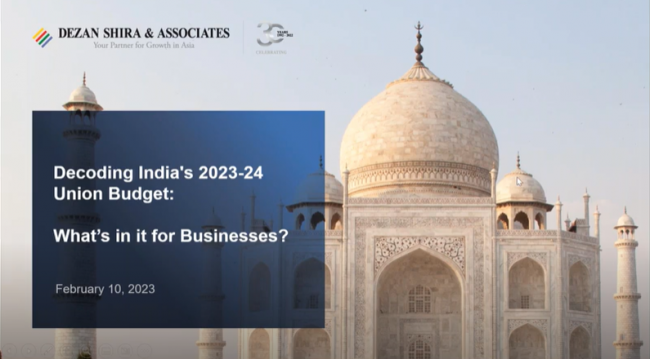India Regulatory Brief: Winter Session of Parliament Begins, Bankruptcy and E-commerce Developments
Government to Face Opposition during Winter Session
The Cabinet Committee on Parliamentary Affairs has announced that the Winter Session of Parliament will commence from the November 26 until December 23. Analysts expect the government to debate a number of key reform bills, including for the Goods and Services Tax Bill (GST), land acquisition, Factories Act amendments, real estate and bankruptcy laws.
The Bharatiya Janata Party (BJP) led National Democratic Alliance (NDA) coalition needs the support from the opposition to get bills passed in the Rajya Sabha (upper house). However, the opposition Indian National Congress (or Congress)-led United Progressive Alliance (UPA) coalition is expected to challenge the BJP’s legislative agenda. During the Monsoon Session of Parliament, the Congress effectively stalled the government’s reform agenda.
 RELATED: The Indian Parliament’s Monsoon Session: What Is Going to Happen?
RELATED: The Indian Parliament’s Monsoon Session: What Is Going to Happen?
Bankruptcy Law Draft to Reduce Barriers to Exit
The Bankruptcy Law Reform Committee (BLRC) recently submitted its list of recommendations to make bankruptcy laws more business friendly. The recommendations will form the basis for a draft bill that will be debated during the upcoming session of parliament. Reform proponents hope to quicken the winding up process for defunct companies and provide easier exit routes for investors. As per the 2015 Doing Business report by the World Bank, India ranks 136 out of 189 countries in terms of the ease of resolving insolvency.
Among the proposed changes by the BLRC, the BLRC has consolidated existing laws on insolvency into one piece of legislation. The BLRC has proposed that applications for insolvency resolution will be processed over a timeline of 180 days, which can be extended by 90 days in exceptional cases. The BLRC advises for the creation of an industry of insolvency professionals and insolvency agencies as well as information utilities, which will be regulated by an insolvency regulator.
During the insolvency resolution period, management control would be passed to a resolution professional supervised by a new regulator. This plan would require the approval from 75 percent of the voting share of creditors. Subject to the approval status, the plan will either be sanctioned or the firm will be liquidated by the adjudicating authority.
 RELATED: India’s Bankruptcy Code to Receive Critical Overhaul
RELATED: India’s Bankruptcy Code to Receive Critical Overhaul
Court Orders Government to Investigate E-commerce Firms
The Delhi High Court ordered the investigation of 21 e-commerce websites for possible violations of Foreign Direct Investment (FDI) laws. The plea was filed by Advocate Rishi Agrawala on behalf of All India Footwear Manufacturers and Retailers Association in July. Investigations have already been started on six e-commerce websites; the government has been given until 18 December to file a reply.
The government bars FDI in business-to-consumer (B2C), multi-brand e-commerce but allows 100 percent FDI in the business-to-business (B2B) segment. Recently, single-brand retailers were allowed to sell online with permission under that category. Firms such as Snapdeal, Flipkart and Amazon India have marketplaces where vendors sell directly to customers.
|
About Us Asia Briefing Ltd. is a subsidiary of Dezan Shira & Associates. Dezan Shira is a specialist foreign direct investment practice, providing corporate establishment, business advisory, tax advisory and compliance, accounting, payroll, due diligence and financial review services to multinationals investing in China, Hong Kong, India, Vietnam, Singapore and the rest of ASEAN. For further information, please email india@dezshira.com or visit www.dezshira.com. Stay up to date with the latest business and investment trends in Asia by subscribing to our complimentary update service featuring news, commentary and regulatory insight. |
![]()
Managing Your Accounting and Bookkeeping in India
In this issue of India Briefing Magazine, we spotlight three issues that financial management teams for India should monitor. Firstly, we examine the new Indian Accounting Standards (Ind-AS) system, which is expected to be a boon for foreign companies in India. We then highlight common filing dates for most companies with operations in India, and lastly examine procedures and regulations for remitting profits from India.
 Taking Advantage of India’s FDI Reforms
Taking Advantage of India’s FDI Reforms
In this edition of India Briefing Magazine, we explore important amendments to India’s foreign investment policy and outline various options for business establishment, including the creation of wholly owned subsidiaries in sectors that permit 100 percent foreign direct investment. We additionally explore several taxes that apply to wholly owned subsidiary companies, and provide an outlook for what investors can expect to see in India this year.
 An Introduction to Doing Business in India 2015 (Second Edition)
An Introduction to Doing Business in India 2015 (Second Edition)
Doing Business in India 2015 is designed to introduce the fundamentals of investing in India. As such, this comprehensive guide is ideal not only for businesses looking to enter the Indian market, but also for companies who already have a presence here and want to keep up-to-date with the most recent and relevant policy changes. We discuss a range of pertinent issues for foreign businesses, including India’s most recent FDI caps and restrictions, the key taxes applicable to foreign companies, how to conduct a successful audit, and the procedures for obtaining an employment visa.
- Previous Article India Regulatory Brief: 1,500 Firms Obtain Security Clearance, Committee to Simplify Income Tax Act
- Next Article India Regulatory Brief: FDI Policy for Single-Brand Retail Relaxed, Regulatory Environment Scrutinized
























